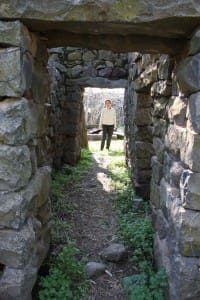This article was originally written for PeaceXPeace.
Neda* was in my house. In Jerusalem! A friend sneaked her in from Ramallah. It’s not easy—getting past the Israeli soldiers at the checkpoint or around the Annexation Wall. But Palestinians have their ways. If they need to get to work or want to shop at the mall or have to visit a sick relative, they get creative. And Neda had a critical mission to fulfill—exploring historic Palestine. So she used her smarts and got herself in. And there she was, in my house. In Jerusalem!
As we set out on our jaunt with our mutual friend Dina, I felt like I was Thelma from the movie “Thelma and Louise.” Neda and Dina were young and reckless and I was old and reckless, and our adventure was thrilling and dangerous and important. My friends hadn’t seen the movie so I just told them it was a feminist classic and I didn’t mention the ending.
We filled the borrowed car with gas and headed north.

Neda delighted in every village, every landscape, every hill, and every stand of trees, and I delighted in her. She is a Palestinian in love with her country, a place denied to her, and I had the honor of appreciating the land through her eyes.
As we approached Tiberias, she was giddy like a child. The GPS sent us round and round in circles before we saw the sea, and she nearly exploded with joy. We walked past the beautiful old Palestinian buildings, built lovingly with black stones, and took photos at ruins and in front of the mosque and the church. We lingered at the sparkling water—imagining the trading and the farming and the family life that once flourished there. It’s a different city now. The shop owners selling falafel are Jewish, but the Palestinian echo is melodic and enduring.
I often hike with my family through demolished Palestinian villages like Lifta and Sataf. They are museums, testimonies to the Palestinian reality before 1948, to the life that would have continued to blossom were it not for the Nakba or catastrophe. These are romantic places, especially when I visit them with Neda and Dina, not, as you might think, because of their imagination of the past. The romance is in their imagination of what will someday be.
It’s too late to prevent the occupation, colonization and dispossession of Palestinians. It happened and continues to happen with ferocious momentum. It’s critical (critical!) to learn about past and present injustices and indignities, but counterproductive to let history hold us back. We can’t build a liberation movement out of the Nakba; we need to struggle for something, for a vision of our future government, economy, educational system, gender relations, environmental goals, and more.
Neda and Dina and I talked late into the early morning hours about the Palestine that can be, that will be, and what we must do to achieve it. Young Palestinian women—inspirational, professional, creative, strategic, smart, fearless, and hardworking. It was hopeful trip.
What is your vision for the Palestine to be?
*Names changed for security purposes.
“or want to shop at the mall”
How Pathetic. Can’t the Palestinians build their own malls instead of going to Israeli malls? Or maybe they think that Malha and Mamilla malls are malls that were built by the Palestinians years ago and the bad Israelis occupied them. The way the Arabs walk around Mamilla mall with a cup of “Aroma” coffee and their hand and an expression of master of the house on their faces, you’d think Aroma is a Palestinian coffee chain and Mamilla mall was built years ago by Abu something instead of Izraeli (a Jewish architect).
Your point is well taken. Why would Palestinians go to the mall in Israel, when Israel is the occupying power? Well it’s certainly not because they want to support Israel. I think it’s just that they want to escape the difficulty of living under occupation, if only for a few hours. And they deserve an escape, don’t you think? That said, many Palestinians do not go to Israeli malls and they boycott, at least to the extent possible, Israeli products. In my family we try to boycott, but we can’t always. Living in Jerusalem is a balancing act, a series of compromises, and a life that’s very hard to feel good about. I try my best not to judge people for the things they do to stay sane under these conditions.
They don’t look to me like they are trying to stay sane when the stroll in west Jerusalem or Mamilla. They look and act as if that is actually their home and not a place that was built by the Israelis and where they never set foot up until a year or so ago.
Their attitude is so confident and natural as if it’s the Jews who are the visitors and west Jerusalem has always been part of the lost Arab Palestine who the Jews now occupy after they kicked out the true inhabitants of the place – the Arabs.
It’s much easier to pretend that nice, clean and developed west Jerusalem has got everything to do with them instead of east Jerusalem or Ramallah or all the other 3rd world Palestinian towns and neighborhoods.